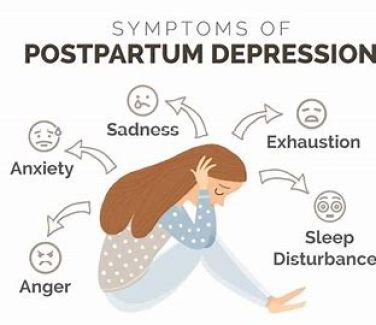Depression, especially postpartum depression, is not, as people think, a symptom of no importance. Depression can drive a person to get rid of himself or another person.
After childbirth, women go through many changes that affect their lives; some accept them and move on, while others may get depressed, which may lead them to get rid of their child.
About 1 in 10 women may experience postpartum depression after giving birth, and sometimes it takes about 3–6 months.

But yes, it will be 100% cured when you choose the right person to help you, especially your doctor, who already knows much about your case. (1)
Postpartum depression can arise from a variety of causes, including:
Hormonal changes
The hormonal changes that occur during pregnancy lead women to be sensitive to everything that goes around.
After birth, an increase in oxytocin (which promotes breastfeeding) and a decrease in other hormones cause some hormonal changes.
Marital changes
A woman may feel that she is unable to take care of her baby, that her feelings towards her husband are not as they were, and that she is unwelcome.
It is the husband’s or partner’s responsibility to support and assist her, as his role is crucial at this moment.
The husband is the first partner and first supporter during pregnancy and childbirth; his support eases labor fatigue, and he can help while the baby cries so that the mother can get extra time to relax and stand up again. (1)
Sleeping disorder
Some children have irregular sleep patterns, especially after birth. Their sense of change, as well as night colics, have a significant impact on their night sleep, which worries the mother and prevents her from getting enough rest.
So there are many consequences of the mother’s restlessness, including physical health, psychological health, relationships, and risky behaviors.
Some consequences may appear for the baby’s physical health, sleep, and motor, cognitive, language, emotional, social, and behavioral development.
The mother’s health and depression will affect mother-child interactions, including bonding, breastfeeding, and the maternal role. (1)
Sense of responsibility
Despite her best efforts to comfort and calm her baby, the mother often feels unfulfilled, especially when others blame her instead of offering assistance.
The child at this stage accompanies the mother everywhere, so the mother may feel that she is not as free as she was and that her life is not hers anymore.
A medical or hereditary history of depression may be present.
If you have suffered from depression before, or if one of your parents was depressed, you may be at greater risk.
Any woman may get such symptoms after birth, and there are many causes, so don’t hesitate to ask for help whenever you feel that you are not well or when any bad thoughts appear.
Some thoughts may include disposing of your child or questioning whether he bears responsibility for your current situation. Contact your healthcare provider when you feel unwell.

Some symptoms of postpartum depression
- permanent anxiety
- Aversion to the child and lack of attachment
- The condition worsens, and the feeling of depression does not disappear.
- Suicidal thoughts
- Attempting to injure yourself or your child.
- Isolation and a dislike of being around people.
- Continuous crying
- Continuous insomnia
Solutions:
1. If the depression persists, it is necessary to visit a specialist who knows better about your condition.
2. Husband support, as well as that of family members, is critical.
3. You must understand that this stage is beautiful in all its details and will pass quickly.
4. Do not confine your life to the house; you can go out for a walk with your child, and this will make you and your child happy.
5. Organising and making time for yourself, your child, and your home (according to what works best for you).
6. Do not hesitate to ask for help from any close person, if any, or from your husband as well.
7. Try to sleep during your child’s sleep time; even if it’s only for 10 minutes per nap, you’ll be less tired than another mother who cleans and arranges her child’s room while he or she sleeps.
8. Your concern about your body is normal, and here are some of our suggestions for you:
- Start walking or exercising regularly.
- Eat healthy, natural foods (whole foods, fruits, and vegetables).
- Avoid sugar (replace it with naturally sweet foods such as dates).
- Discolorations are normal and will take about 3–4 months to disappear.
- If you prepared your body earlier, as we mentioned earlier, you will easily get your body back.
- Avoid processed or ready-made foods.
Being a mother is so precious and can be full of challenges that may fatigue you. Particularly when dealing with postpartum depression, your life may deteriorate and become extremely challenging, but rest assured, this will soon subside, allowing you to experience motherhood in its true sense.
Every mother can take care of her child, and this comes gradually and with ambition (from the reading and research you did before pregnancy). Frequently, care and interest are instinctive and originate within the mother.
From birth to adulthood, the mother provides safety and a home for her child. Your child relies on you and your presence in his life, so try to live healthily by eating healthy food, exercising regularly, avoiding sugary drinks, and not stressing out. Being healthy from the inside will reflect your well-being on the outside.
By having a healthy version of yourself, you will be strong and be near your loved ones your entire life.
